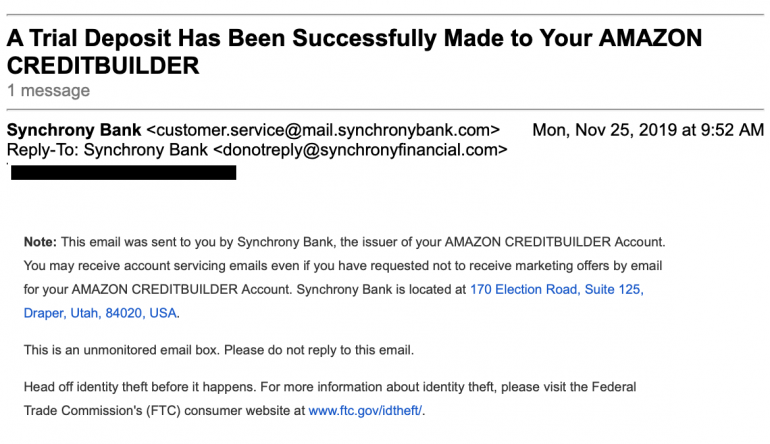At NerdWallet, we strive to help you make financial decisions with confidence. To do this, many or all of the products featured here are from our partners. However, this doesn’t influence our evaluations. Our opinions are our own.
Here’s something you don’t want on your plate before Thanksgiving: a suspicious-sounding email or text alerting you about a phantom account. But that’s what scores of consumers say they received from Synchrony Bank this week.

A screenshot of one of the emails Synchrony sent
The messages, referring to the Amazon Credit Builder Card, were sent on Nov. 25, 2019, to many people who neither had the card nor had applied for it. The emails and text messages about the card — which, like other secured cards, requires an upfront security deposit — included alarming language such as “a trial deposit has been successfully made” or “action required on your application.” That led to worried recipients trying to contact both Synchrony and Amazon via phone and social media for clarification. Synchrony is the bank that issues the Amazon Credit Builder Card and manages its accounts.
It wasn’t a phishing scam, but rather an error on Synchrony’s part. The issuer confirmed the mix-up in an email to NerdWallet late Nov. 25. In a message to customers, it apologized and assured them that no data breach had taken place and no personal information had been compromised.
How did it happen?
Although Synchrony wouldn’t say what caused the messages to go out, the issuer did confirm that the mistake was “an internal error” on its end and not the result of fraudulent activity.
“The email address associated with any Synchrony accounts (including non-Amazon accounts) may have received these erroneous emails,” a Synchrony spokesperson said in an email to NerdWallet.
Amazon also confirmed in a statement that the issue didn’t stem from the retailer’s side.
“Amazon is aware of a notification that was distributed by Synchrony in error to some customers,” said an Amazon spokesperson in an email to NerdWallet. “They are investigating the root cause. Additional inquiries can be sent to Synchrony.”
What should you do?
According to Synchrony, nothing.
In a brief initial statement on its website Nov. 25, the issuer apologized for the confusion over the “unplanned email” and noted that “no action needs to be taken.” Synchrony followed up later in the evening with more detailed explanations via social media and via email to Synchrony customers. The email read:
“At Synchrony we take customer satisfaction very seriously. We are writing to inform you one or more emails or text messages you may have received from Synchrony regarding ‘a trial deposit has been successfully made’ or ‘action required on your application’ on Monday, November 25 was sent in error.
“This was an internal error at Synchrony and did not involve a data breach or fraudulent activity. We have confirmed none of your personal data was compromised. We apologize for the error and regret any concerns this may have caused. We are taking action to ensure this cannot happen again.
“Please disregard the email or text message and no further action is required.
“We sincerely thank you for your patience and understanding.”
General security tips
Any time you’re concerned or uneasy about the safety of your accounts, there are proactive steps you can take to safeguard your personal information. Some examples:
- Stay vigilant when it comes to phishing scams: Phishers try to trick customers into giving away personal data, often by misrepresenting themselves in emails that include company names and fake-but-realistic-looking brand logos. This wasn’t a phishing scam, but it resembled one with its call for “action required.”
- Change and strengthen passwords: You could do this for your accounts with both Synchrony and other issuers.
- Monitor credit card statements for suspicious or unfamiliar charges: If you find a charge you didn’t make, call the number on the back of your card and report it.
- Check your credit reports and scores: You can get an annual credit report every year from each of the big three credit bureaus: Experian, Equifax and TransUnion. These reports can tell you whether any unauthorized accounts have been opened. Many credit cards also offer free FICO scores, which you can monitor for any negative changes.
- Freeze your credit: This blocks access to your credit reports, meaning new accounts can’t be opened. You can request a credit freeze from each individual bureau and can later unfreeze, all for free.
"card" - Google News
November 27, 2019 at 03:55AM
https://ift.tt/2rwPt6I
Amazon Card Emails Were a Mistake, Not a Hack, Says Issuer - NerdWallet
"card" - Google News
https://ift.tt/33FwZiF
Shoes Man Tutorial
Pos News Update
Meme Update
Korean Entertainment News
Japan News Update
Bagikan Berita Ini















0 Response to "Amazon Card Emails Were a Mistake, Not a Hack, Says Issuer - NerdWallet"
Post a Comment